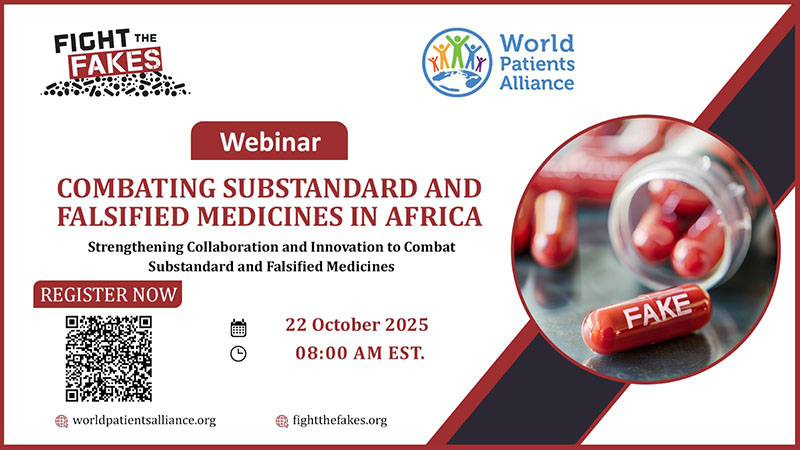
Webinar: Combating Substandard and Falsified Medicines in Africa
Webinar Report
Date: October 29, 2025
Organized by: World Patients Alliance (WPA) in collaboration with the Fight the Fakes Alliance
Overview
WPA, in partnership with the Fight the Fakes Alliance, hosted a high-level webinar titled “Combating Substandard and Falsified Medicines: Strengthening Global Surveillance and Partnerships” on October 29, 2025.
This virtual event convened patient advocates, regulatory experts, public health professionals, and policymakers from around the world to spotlight the growing threat of substandard and falsified (SF) medicines and outline collaborative solutions for prevention, detection, and coordinated response.
The webinar featured AI-powered multilingual translation and audio interpretation in over 50 languages, ensuring accessibility for participants from diverse regions and backgrounds
Key Objectives of the Webinar
• Highlighting global and regional trends in the circulation of substandard and falsified medicines.
• Presenting WHO strategies for prevention, surveillance, and coordinated response.
• Encouraging multisectoral collaboration across patient organizations, regulators, and law enforcement.
• Sharing regional and international best practices in combating SF medicines.
Speakers, Panelists, and Moderators
The webinar featured a distinguished lineup of global leaders, technical experts, and patient advocates:
Welcome and Opening Remarks
Andrew Spiegel, WPA, USA
Andrea Vassalotti, Chair, Fight the Fakes Alliance, Switzerland
Keynote Presentation
Pernette Bourdillon Esteve, Technical Officer, Market Surveillance and Control Team, WHO, Switzerland
Panel Discussion Moderator
Hussain Jafri, CEO, WPA, USA
Panelists
Pernette Bourdillon Esteve, Technical Officer, WHO, Switzerland
Anthony Bakenga Kapeta, Legal Officer, AUDA-NEPAD, South Africa
Regina Mariam Namata Kamoga, Executive Director, CHAIN, Uganda
Catherine Duggan, CEO, International Pharmaceutical Federation (FIP), Netherlands
Wilson Chandomba, Goodwill Ambassador, Fight the Fakes Alliance, Zimbabwe
Closing Remarks
Hussain Jafri, CEO, WPA, USA
Welcome and Opening Remarks
The webinar began with introductory remarks by Andrew Spiegel, Chair of the WPA, who emphasized the urgent need for action in light of increasing reports of substandard and falsified medicines globally. He reaffirmed WPA’s commitment to elevating the patient voice in shaping drug safety policies and surveillance systems.
Andrea Vassalotti, Chair of the Fight the Fakes Alliance, followed with a call for global solidarity, noting the role of strategic partnerships in mobilizing public and private sectors. She spoke of leveraging platforms such as World Heart Day and the Global Circulatory Health Summit to raise awareness and build industry engagement around counterfeit medicine prevention.
Key Presentation
Current Trends and Challenges in Combating Substandard and Falsified Medicines
Pernette Bourdillon Esteve, Technical Officer at WHO’s Market Surveillance and Control (MSC) team, delivered an in-depth overview of WHO’s global surveillance strategy and the escalating threat posed by substandard and falsified medical products (SFMPs). She introduced WHO’s Global Surveillance and Monitoring System (GSMS), highlighting its role in collecting data from country focal points and supporting incident response through technical guidance and risk alerts.
Pernette outlined key driving forces of SFMP circulation, including weak regulatory systems, supply chain vulnerabilities, and lack of harmonized global governance. She showcased examples of WHO interventions, such as the issuance of multiple medical product alerts, most recently for DEG-contaminated syrups in India and falsified propylene glycol in Pakistan.
A key case study discussed was the rising contamination of falsified medicines with nitazenes, dangerous synthetic opioids with no approved medical use. She detailed WHO’s 2025 threat assessment, which urged national authorities to coordinate with poison centers and law enforcement to prevent further harm. Pernette also presented WHO’s capacity-building initiatives, including GSMS self-paced e-learning courses, delegated trainer toolkits, and regional in-person training workshops.
Panel Discussion and Q&A
The panel, moderated by Dr. Hussain Jafri, CEO of the WPA, featured diverse insights from patient advocates, regulators, and health system experts. Each speaker contributed unique regional perspectives and highlighted practical challenges on the ground.
Anthony Bakenga Kapeta from AUDA-NEPAD emphasized the importance of legal harmonization and stronger continental regulatory frameworks. He pointed to efforts underway in the African Union to align enforcement mechanisms and data sharing across member states to better tackle counterfeit medicines.
Regina Kamoga, a long-time advocate from Uganda, drew attention to how patient voices and civil society organizations are essential in identifying gaps in reporting and accountability. She shared her experience leading public awareness campaigns through CHAIN and emphasized the need for better grassroots surveillance and patient-centered response mechanisms.
Catherine Duggan of FIP underscored the critical role of community pharmacists in detecting and reporting suspicious products. She stressed the need for integrating surveillance responsibilities into pharmacy training and licensing to strengthen the frontline response.
Wilson Chandomba, representing the Fight the Fakes Alliance in Zimbabwe, delivered a powerful testimony on the real-life harm caused by SF medicines in low-resource settings. He called for accessible and anonymized reporting platforms and stronger law enforcement collaboration to disrupt criminal networks profiting from fake medicines.
The panel unanimously agreed on the importance of sustained funding, enhanced coordination, and stronger data systems for effective response. Emphasis was placed on patient involvement, not just as victims but as empowered agents of change.
Key Takeaways and Recommendations
Strengthen Surveillance Systems
Investment in integrated global and national surveillance platforms like GSMS is essential to detect and respond to SF medicine circulation promptly.
Empower Health Workforce and Community Pharmacies
Pharmacists and primary care workers must be trained and enabled to detect, report, and escalate SFMP cases as part of routine practice.
Foster Multisectoral and Cross-Border Partnerships
Government agencies, civil society, law enforcement, and global health actors must collaborate to develop harmonized policies and regulatory responses.
Raise Public Awareness and Build Patient Capacity
Patients must be educated and supported to identify risks, demand safe medicines, and report adverse events through accessible platforms.
Closing Remarks
In his closing address, Dr. Hussain Jafri emphasized that combating substandard and falsified medicines is not merely a technical challenge, it is a matter of global health equity and human rights. He reiterated that patients, as end-users of health systems, have both the right and responsibility to be central to solutions. The webinar concluded with a collective call to action: for every actor in the healthcare ecosystem to work towards transparency, accountability, and safety in the global medicine supply chain.
The WPA, remains committed to supporting this agenda through global partnerships, policy advocacy, and empowering patients worldwide.
Speakers
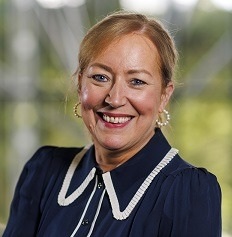
Catherine Duggan is the Chief Executive Officer of the International Pharmaceutical Federation and is responsible for visionary leadership, support, development, advocacy and growth across the 150+ member organisations and the four million pharmacists and pharmaceutical scientists FIP represents. FIP is a founder member of the World Professions Health Alliance (represents 41 million health professionals across medicine, nursing, dentistry, physiotherapy and pharmacy) and Dr Duggan is chair of the CEOs of WHPA in 2024. FIP signed a MOU with WHO in May 2019 at the World Health Assembly meeting which builds on the formal established relationship WHO and FIP have held since 1948 and secures how pharmacy contributes globally to Primary Health Care to deliver Universal Health Coverage. By signing the profession up to the Astana declaration in 2018, pharmacy will present evidence of impact to health ministers of pharmacy’s impact (science, practice, workforce) during 2024. This involves data through the FIP observatory, support through the FIP platform for provision and our FIP wide programmes to deliver the 21 FIP development goals. Dr Duggan has published widely and presented at national and international meetings and has a wealth of people and programme management experience. She is a recognised leader across the profession working with many networks within and across the profession and, more widely, health and business. Catherine has worked in community, primary care, hospital and academia. Between 2007 and 2009, Catherine was the Chair of the United Kingdom Clinical Pharmacy Association and then an elected member of the Council of the RPSGB. A double graduate from the School of Pharmacy, University of London (now UCL School of Pharmacy), Dr Duggan received a Fellowship of the School in 2013 and was awarded an honorary Professorship from the School of Pharmacy, University of Nottingham in 2018. She holds Fellowships of both the Royal Pharmaceutical Socity the Royal Society of Arts. Catherine was awarded the Nagai International Woman Scientist Award in May 2021, on behalf of the Academy of Pharmaceutical Science and Technology, Japan and is the current European Chair for United States Pharmacopeia European Charter. Catherine is an avid film lover, enjoys singing and travelling, fine wine and dining, sports and dancing.

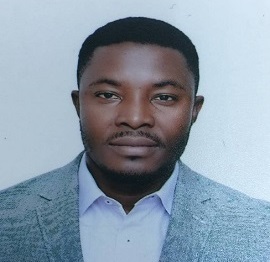


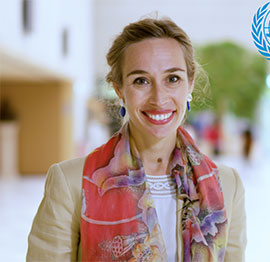
Pernette Bourdillon Esteve is a Technical Officer Market Surveillance and Control (MSC) team at the World Health Organization (WHO). She leads strategic initiatives to strengthen global surveillance and response systems for SF medical products, managing the Global Surveillance and Monitoring System database and guiding policy development through data analysis. With over 15 years of international public health experience, Pernette has worked across global policy and technical domains. Her expertise spans incident management, strategy design, data interoperability, and training. Prior to WHO, she held roles at the United Nations Office against Drugs and Crime, UNITAID, the French Ministry of Foreign Affairs, and in the private sector, consistently focusing on global health. She holds a Bachelor's degree in public health, a Masters in Political Science and is currently pursuing a PhD in global health, focusing on the interoperability of datasets linking SF medical products, diseases, and populations.
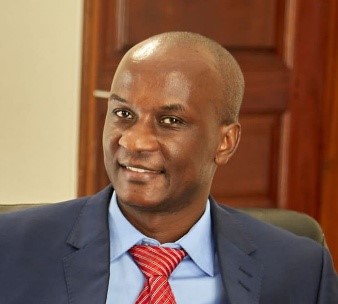
Wilson Chandomba, CSCL is an award-winning Health and Humanitarian Supply Chain Expert, GSDP (Good Storage and Distribution Practices) Specialist, and a Certified Supply Chain Leader (CSCL) with more than 26 years of experience in pharmaceutical quality assurance and logistics across Africa. He is the Founder and Managing Consultant of CMCOMMS Supply Chain Quality Assurance and the Southern Africa Regional Lead for the International Association of Public Health Logisticians (IAPHL). He received the Outstanding Achievement Award in Humanitarian & Health Supply Chain Management at the 2025 Africa Supply Chain Excellence Awards (ASCEA), for pioneering the use of GSDP as an affordable and accessible safeguard against SFMPs. Wilson has trained over 2,000 professionals—from regulators and logisticians to customs officers, freight forwarders, and frontline health workers


